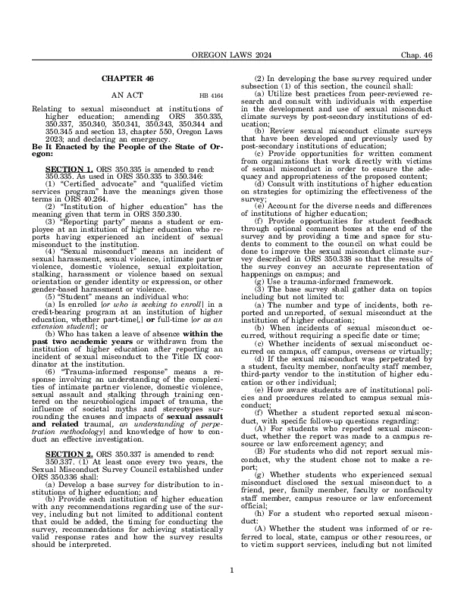ORS 350.340
Required employment of certified advocate
- exceptions
- qualifications
- duties
(1)
Intentionally left blank —Ed.(a)
Except as provided in paragraph (b) of this subsection, each institution of higher education shall employ at least one certified advocate as part of a institution-based qualified victim services program.(b)
An institution of higher education is not required to employ a certified advocate if the institution:(A)
Intentionally left blank —Ed.(i)
Does not have an institution-based qualified victim services program; or(ii)
Has fewer than 1,000 enrolled students who reside on campus; and(B)
Intentionally left blank —Ed.(i)
Partners with a local victim advocacy organization to provide a certified advocate;(ii)
Ensures that the certified advocate has on-campus office hours; and(iii)
Ensures that the services of the certified advocate are provided without charge to enrolled students.(2)
A certified advocate employed by an institution of higher education under this section shall be appointed based on the individual’s experience and demonstrated ability to effectively provide victim services related to sexual misconduct and:(a)
May not:(A)
Be a student of the institution;(B)
Be a Title IX coordinator for the institution;(C)
Be an authorized administrator of disciplinary processes on behalf of the institution;(D)
Be a member of campus police or law enforcement; or(E)
Have any additional job responsibilities that could create a conflict of interest, including but not limited to being a general counsel, director of athletics, dean of students, clergy member, or any employee who serves on a judicial or hearing board or to whom an appeal regarding an allegation of sexual misconduct may be made; and(b)
Shall receive training:(A)
Required to be a certified advocate;(B)
On the requirements of Title IX of the Education Amendments Act of 1972, 20 U.S.C. 1681 to 1688, as amended;(C)
On the policies of the institution of higher education relating to sexual misconduct; and(D)
On trauma-informed response.(3)
A certified advocate who is employed under this section shall:(a)
Provide confidential services to students and inform students of all information required to be provided under ORS 350.330 (Written policies on sexual harassment, sexual assault, domestic violence, dating violence and stalking) and 350.331 (Written sexual assault protocol);(b)
Provide written notification to all institution staff involved in providing or enforcing supportive measures or accommodations of the respective duties of these staff members;(c)
If directed by a student, assist the student in contacting campus police or local law enforcement agencies to make a report;(d)
Notify students of their rights, and the responsibilities of the institution, regarding protection orders, no contact orders and any other lawful ordered issued by the institution or by a criminal, civil or tribal court;(e)
Be subject to privilege as a certified advocate under ORS 40.264 (Rule 507-1. Certified advocate-victim privilege);(f)
Coordinate with on-campus sexual misconduct response resources and any community-based domestic and sexual violence advocacy agency with which the institution has entered into a memorandum of understanding under ORS 350.341 (Required memorandum of understanding) within a reasonable time after being designated as a certified advocate; and(g)
If requested by signed written consent from a student, assist the student with coordinating on-campus supports and supports available with any community-based domestic and sexual violence advocacy agency with which the institution has entered into a memorandum of understanding under ORS 350.341 (Required memorandum of understanding).(4)
A certified advocate employed under this section:(a)
If requested by a student, may attend an administrative or institution-based adjudication proceeding as the advocate or support person for the student;(b)
May not:(A)
Be required to report an incident to the institution or a law enforcement agency unless otherwise required to do so by state or federal law;(B)
Disclose confidential information, including but not limited to the name, contact information or any personally identifiable information of a student or any information on the sexual misconduct, without the prior written consent of the student who provided the information to the certified advocate;(C)
Provide services to both the reporting party and the responding party of the same sexual misconduct incident; or(D)
Act as a counselor or therapist.(5)
Nothing in this section may be construed to limit either party’s right of cross examination of the certified advocate in a criminal or civil proceeding if the advocate testifies after written consent has been given.(6)
Providing notice to a certified advocate of an alleged act of sexual misconduct or an advocate’s performance of a service under this section may not be considered actual or constructive notice to the institution of higher education of the alleged act.(7)
If a conflict of interest arises for an institution of higher education in which a certified advocate is advocating for a student’s need for sexual misconduct crisis services or for campus resources or law enforcement services, the institution may not discipline, penalize or otherwise retaliate against the certified advocate for representing the interest of the reporting party. [2023 c.550 §6]
Source:
Section 350.340 — Required employment of certified advocate; exceptions; qualifications; duties, https://www.oregonlegislature.gov/bills_laws/ors/ors350.html (accessed May 26, 2025).
